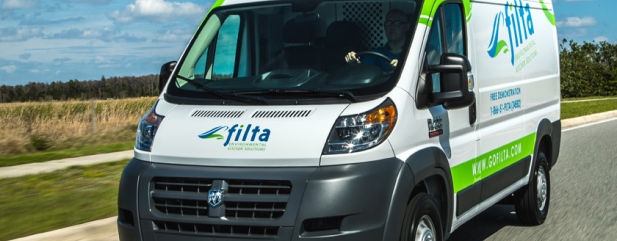Archived article
Please note that tax, investment, pension and ISA rules can change and the information and any views contained in this article may now be inaccurate.
Franchise firm has tasty profit and dividend appeal

Franchise business Filta (FLTA:AIM) is an enticing investment proposition, in our opinion. It is a profitable business with low capital expenditure requirements, lots of repeat revenue and potential for decent dividend growth in the future.
The company floated on AIM in November 2016 at 83p and is the owner of FiltaFry, a business which cleans deep fryers and filters the oil used to cook food. Filta has operations in the US and UK and plans to expand into mainland Europe and Canada.
Very broad customer base
There is a misconception that Filta only has restaurant chains as customers. Chief executive Jason Sayers says these companies only account for one quarter of sales. The customer base is much broader, covering hotels, banks, tech firms, secondary schools, casinos, hospitals, universities and more.
One of the biggest markets for Filta is sports arenas and stadiums which are full of fryers due to the need to serve food to a large number of people as quickly as possible. ‘Frying is a quick way of cooking food,’ says chief executive Jason Sayers. ‘There are 210 fryers alone in the new San Francisco 49ers stadium, for example.’
Filta provides cleaning services to many well-known sporting facilities including Wembley Stadium and Arsenal FC in the UK; and stadiums used by Denver Broncos and Cleveland Browns in the US.
Other customers include McDonald’s, KFC, Burger King, Hilton, Holiday Inn, Pizza Hut, Microsoft, AT&T, Yale University, Cedars-Sinai hospital in Los Angeles, Tesco (TSCO), Sainsbury’s (SBRY) and Mitchells & Butlers (MAB).
Being an approved vendor for some of the world’s biggest catering groups including Compass (CPG) and Sodexo gives Filta an edge over its primary competition, according to Sayers. ‘Our main rivals are local “man and a van” operators. It’s hard for them to compete when they don’t have national contracts like us.’
Helping franchises in many ways
Filta spends a lot of time helping its franchisees to win new business, find new technicians and even undertaking some of the administration work.
‘We want our franchisees to grow as our success is correlated to their success,’ explains the CEO.
The company has 142 franchisees in the US and in the UK it has 40 franchisees and a direct network of 18 vans.
Multiple sources of revenue
It earns revenue in a variety of ways. Franchisees in the US pay $85,000 to get going; of this amount, $35,000 is a territory fee to Filta which is cash up front but amortised over 10 years in the accounts where it appears as deferred income.
The remaining $50,000 pays for training, two weeks with a sales person from the parent group, a cleaning machine and kitting out a van.
The US start-up fees are much higher than the UK’s £15,000 ($19,134) charge as the former territory has greater growth potential and is more likely to see multiple vans per franchisee, says Sayer.
Ongoing fees are derived from a variety of sources. In the US, franchisees pay $7,000 to rent a filtration and cleaning machine each year. Filta receives 15% margin on the sale of waste oil; $36 annual fee per FiltaCool Panel filter; and it takes a margin on supplies to franchisees including chemicals, oil, as well as charging an administration fee on national accounts.
Significant growth opportunities
Growth will come from attracting new franchisees, existing franchisees doing more work and geographical expansion. Filta has various company-owned operations to aid franchisee’s cross-selling efforts, including maintenance and the provision of new seals for refrigeration.
More recently, Filta has introduced a service called FiltaZyme whereby franchisees use fat-eating enzymes to clear drains, providing even more recurring revenue for the plc business.
‘We saw an opportunity as existing customers already have a budget to clear drains. We introduced it earlier this year and so far eight out of 10 customers we’ve approached have taken up the service,’ says Sayer. ‘It will take two years to properly introduce the service across our estate.’
Risks and rewards
A key risk for the investment case is elevated health concerns about consuming deep fried food. The company says frying is a growing market, despite the increasing number of government and media initiatives to raise awareness of healthy eating.
There is also limited liquidity in the shares. Only 28.4% of the company is held in public hands. The Sayers family owns 49.6% of the business and has no intention of selling soon, according to Jason Sayers. Directors aren’t allowed to sell any shares until November 2018 at the earliest.
The company raised £4.3m of new money at the IPO (initial public offering) and a further £1.9m went to executive director Victor Clewes who sold one third of his pre-IPO holding for personal reasons.
Broker Cenkos forecasts £2m pre-tax profit in 2017, rising to £2.5m in 2018. Gross margins are in the region of 45% and the business is expected to show a £4.6m net cash position at the end of the current year, rising to £5.8m a year later.

Jason Sayers says he wants to build up Filta to be a £100m business, more than three times its current £31.5m value. We think that can be achieved. Buy at 117p. (DC)
Important information:
These articles are provided by Shares magazine which is published by AJ Bell Media, a part of AJ Bell. Shares is not written by AJ Bell.
Shares is provided for your general information and use and is not a personal recommendation to invest. It is not intended to be relied upon by you in making or not making any investment decisions. The investments referred to in these articles will not be suitable for all investors. If in doubt please seek appropriate independent financial advice.
Investors acting on the information in these articles do so at their own risk and AJ Bell Media and its staff do not accept liability for losses suffered by investors as a result of their investment decisions.
Issue contents
Big News
Editor's View
Great Ideas Update
Investment Trusts
Larger Companies
Main Feature
Money Matters
Smaller Companies
Story In Numbers
- Petropavlovsk co-founder kicked off the board after 23 years’ service
- Which FTSE 350 Shares have Lost Shareholders Money
- Which FTSE 350 Shares Rewarded Shareholders
- $390bn wiped off global drug sales forecasts
- 98.6% vote in favour of Standard Life/Aberdeen merger
- London’s shrinking bank industry
- 150M Hurricane blows Crystal Amber down

 magazine
magazine










